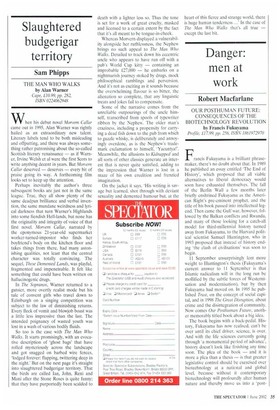Slaughtered budgerigar territory
Sam Phipps
THE MAN WHO WALKS by Alan Warner
Cape, £10.99, pp. 282, ISBN 0224062948
When his debut novel Malvern Callar came out in 1995, Alan Warner was rightly hailed as an extraordinary new talent. Literary labels tend to be both misleading and offputting, and there was always something rather patronising about the so-called Scottish literary renaissance — as if Warner, Irvine Welsh et al were the first Scots to write anything decent in years. But Moivem Callar deserved — deserves — every bit of praise going its way. A forthcoming film looks set to keep up the attention.
Perhaps inevitably the author's three subsequent books are just not in the same league. True, they all show plenty of the same deadpan brilliance and verbal invention, the same mundane weirdness and lyrical darkness that turn Warner's Highlands into some fiendish Hell-lands, but none has the originality and integrity of voice of that first novel. Moivern Ca/Jar, narrated by the eponymous 21-year-old supermarket worker-turned-impostor who finds her boyfriend's body on the kitchen floor and takes things from there, had many astonishing qualities, not least that the central character was totally convincing. The sequel, These Demented Lands, was playful, fragmented and impenetrable. It felt like something that could have been written on hallucinogenic drugs.
In The Sopranos, Warner returned to a gutsier, more overtly realist mode but his tale of convent girls who travel down to Edinburgh on a singing competition was subject to the law of diminishing returns. Every fleck of vomit and blowjob boast was a little less impressive than the last. The intended poignancy of wasted youth was lost in a wash of various bodily fluids.
So too is the case with The Man Who Walks. It starts promisingly, with an evocative description of 'ghost bags' that have rolled mysteriously across the landscape and got snagged on barbed wire fences, 'lodged forever: flapping, twittering deep in the night.' But on the next page it's straight into slaughtered budgerigar territory. That the birds are called Ian, John. Reni and Mani after the Stone Roses is quite funny; that they have purportedly been scalded to death with a lighter less so. Thus the tone is set for a work of great cruelty, masked and licensed to a certain extent by the fact that it's all meant to be tongue-in-cheek.
Whereas Morvern displayed a vulnerability alongside her ruthlessness, the Nephew brings no such appeal to The Man Who Walks. Detailed to track down his eccentric uncle who appears to have run off with a pub's World Cup kitty — containing an improbable £27,000 — he embarks on a nightmarish journey stoked by drugs, mock philosophical ramblings and perversion. And it's not as exciting as it sounds because the overwhelming flavour is so bitter, the alienation so complete, that any linguistic treats and jokes fail to compensate.
Some of the narrative comes from the unreliable outpourings of the uncle himself, transcribed from spools of typewriter ribbon by the Nephew. The older man's craziness, including a propensity for carrying a dead fish down to the pub from which to guzzle whisky, is deliberately and annoyingly overdone, as is the Nephew's trademark exclamation to himself, `Yacuntyar. Meanwhile, the allusions to Kidnapped and all sorts of other classics generate an interest that is never quite satisfied, adding to the impression that Warner is lost in a maze of his own erudition and frenzied imagination.
On the jacket it says, 'His writing is savage but learned, shot through with deviant sexuality and demented humour but, at the heart of this fierce and strange world, there is huge human tenderness In the case of The Man Who Walks that's all true — except the last bit.






































































 Previous page
Previous page